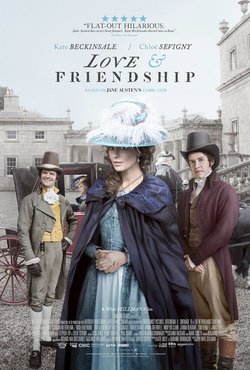
I am fond of Jane Austen, though I’ve only read two of her novels. I’m a huge fan of Whit Stillman. So when I review his latest effort, Love & Friendship (which looks like it might be the big hit he’s deserved for so long) my perspective is that of viewing Austen-land from Stillman-land. This is probably fairly unusual.
People have noted the similarities between Stillman’s work and Austen’s books from the beginning. Metropolitan, his first movie, is self-consciously Austenian, a point paradoxically emphasized by the main character’s insistence that he’s never read Jane Austen because he prefers to read literary criticism of her. That’s an exquisitely Austenian comment on Austen.
And that’s what we also have in Love & Friendship, based on an Austen novella, Lady Susan. It’s meta-Austen. It tells its story, comments on the story, and laughs gently at its comments. It’s a lot of fun. It might be the perfect movie through which to introduce an intelligent consumer who’s not familiar with Austen’s work (I’m sure there are such people; I’m almost one of them) to her world.
Lady Susan (Kate Beckinsale), the main character, is “the most notorious flirt in England.” A young and beautiful widow, we meet her in a silent-movie preface (with subtitles) in which she is driven from the home of a relation, having broken hospitality by seducing the man of the house (she thinks this response shockingly unjust). She then goes to stay with other relations, where she attempts to win a handsome younger man as her own husband while scheming to marry her virtuous daughter off to the stupidest man in England, James Martin (Tom Bennett). Bennett’s scenes are the funniest in the movie – he’s Wodehousian in his affable ignorance. He’s certain there are Twelve Commandments (general ignorance of the Ten Commandments is a running joke in this movie – a comment, I assume, on our own times). Lady Susan is Donald Trumpian in her invincible self-regard and lack of concern for the feelings of others. She’d be unbearable if forces of cosmic justice, acting behind the scenes, didn’t conspire against her machinations – something she would deeply resent if she were aware of it.
I liked Love & Friendship a lot, and suspect I’ll like it more when I’ve seen it a few more times (which I’m sure I will). I was pleasantly surprised by the crowd at the showing I attended – much larger than I expected, and mostly gray-haired, people who I suspect don’t go out to the movies much anymore.
Highly recommended. Not for kids, because much of the humor is sexually sophisticated (though not smutty at all), and because the vocabulary hovers at a high altitude.

